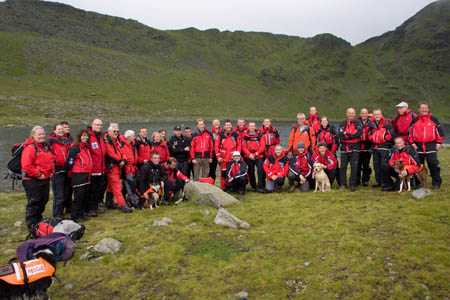The mountain rescue community must wonder what it has to do to squeeze any cash out of Whitehall.
For more than three years, representatives of Mountain Rescue England & Wales have been lobbying Treasury ministers, the Home Office and even an EU commissioner to try to claw back some of the £200,000 its team pay annually in VAT and other taxes.
For the volunteer teams that won such praise during the November floods and the ensuing prolonged big freeze, the refunding of their fuel duties and other taxes paid on equipment would mean a bit more time spent with their families and less having to be devoted to shaking collection tins. In fiscal terms, the amount is tiny, yet to the 56 mountain rescue teams in England and Wales, it would mean a lot.
It didn’t help when the then Prime Minister Gordon Brown promised Simon Cowell a refund on his Haiti relief fund CDs at the drop of a hat. Then, as the political parties made their pitch for the popular vote came a pledge: on page 83 of the Liberal Democrats’ manifesto – a bold statement in six words – they would ‘Refund VAT to mountain rescue services’.
Two weeks after the election, with Nick Clegg and David Cameron melding their policies for a coalition government, mountain rescuers must have scoured avidly the 36-page document for mention of the VAT refund.
They will be disappointed. There is a commitment to replace IR35 for small business taxation; the abolition of Regional Spatial Strategies; Post Office account holders will be able to benefit from direct-debit discounts; and football supporters may stand a better chance of forming co-operatives to own their clubs with the encouragement of the reform of football governance rules.
Nowhere in the document is there mention of the Lib Dems’ manifesto pledge on rescuers’ VAT.
However, Tim Farron, returned as Liberal Democrat MP for Westmorland and Lonsdale with an increased majority, feels the fight is not lost. He has supported the Lake District’s 12 teams and their colleagues across England and Wales, and was instrumental in getting the pledge into his party’s manifesto.
He said it was the kind of small detail that would be left out of the policy document and is still hopeful of securing some cash for the rescuers. “I was given very positive signals that this wasn’t the type of detail that would go in,” he said. He pointed out that the Lib Dems had David Laws as Chief Secretary to the Treasury and Vince Cable as Business Secretary.
The MRT’s tax refund was not one of the policies that went in the coalition horse trading, according to Farron. “This is not one of the things we had to give way on,” he said. “I am optimistic that we will get it. It is a cheap ask for something that is such great value and I can’t see why they would say no to it.
“We can get round the European Union rules and they can then claim back a grant for the same amount. We are continuing to lobby. We haven’t had a yes, but we haven’t had a no.”
grough understands that the three-man team mandated by MRE&W’s finance committee will continue to press its case.
Other items in the Conservative-Liberal Democrat coalition document may spell leaner times for some bodies that look after the great outdoors.
There is a commitment to shave £6bn off the Treasury bill in the coming year, while defending frontline service and increasing health spending in real terms. Something, therefore, has to give.
On coastal access, the pre-election warning of Lib Dem peer Lord Greaves that ‘While we were passing the bill through Parliament the Conservatives sometimes seemed both partial and lukewarm in their support for this part of it’ is borne out by the statement today that: “We will take forward the Marine and Coastal Access Act and ensure that its conservation measures are implemented effectively.” Note the emphasis on its conservation measures and ambiguity on the coastal access corridor.
There is also a commitment to reduce the number and cost of quangos. Among quangos the outdoor community may be familiar with are Natural England, the national park authorities, Ordnance Survey, the Forestry Commission, regional development agencies, the Maritime and Coastguard Agency and Sport England. Natural England and the national parks escaped largely unscathed by cuts during the last administration, but it seems certain they will be asked to look very carefully at their expenditure.
However, there is the welcome pledge to maintain the green belt, sites of special scientific interest and other environmental protections, and create a new designation – similar to SSSIs – to protect green areas of particular importance to local communities.
Caroline Spelman was appointed Defra Secretary. She said: “I am delighted to have been appointed Secretary of State for Environment, Food and Rural Affairs. The department is responsible for many of the things that are vital to our quality of life: the food we eat, the air we breathe and how we manage the land we live on and the seas that surround our shores.
“I will work across Government and beyond to respond to the challenges of increasing food production, adapting to climate change, protecting our natural environment and ensuring we live sustainably.” She will be responsible for Natural England.
Her second-in-command is another Conservative, Jim Paice, who will oversee the Forestry Commission.
Under-Secretary of State Richard Benyon, a former soldier whose great-great-grandfather Lord Salisbury was a Tory Prime Minister, completes the Conservative team at Defra, with responsibility for implementation of the Marine and Coastal Act and wider access issues.
There is a coalition pledge to increase the democracy of national park authorities, which Tim Farron espouses enthusiastically. He said: “We have had a commitment to elected members of national parks so there is a good chance of that.” On the proposed enlargement of the Lake District and Yorkshire Dales national parks, there is uncertainty. Mr Farron favours local communities having a veto on such expansion.
Cycling and walking will be supported as sustainable travel methods with promotion of these activities.
The promised vote on the repeal of the Hunting Act will go ahead but it will be a free vote, with the possibility that anti-hunt MPs from all parties could combine to defeat the move.
Many of the decisions affecting outdoor matters in Scotland, Northern Ireland and Wales are dealt with by their devolved administrations, and mountain rescue teams in Scotland receive £300,000 from the Scottish Government. It seems unlikely the Westminster coalition Government will want to rock the boat with its devolved partners, which have more experience with minority government and coalition.
The very final page of the Conservative-Lib Dem document says: “As a result of devolution, many decisions taken by UK ministers or in the Westminster parliament apply to England only.”



Dave Gibson
20 May 2010Good article Bob. Thanks for sumarising all the issues.